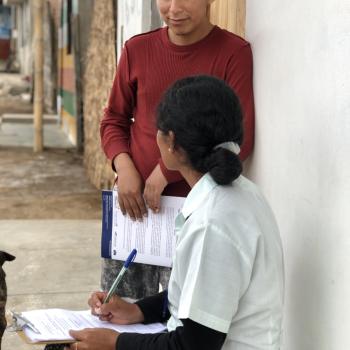
Young Lives' research has shed new light on the drivers and impacts of child poverty, generating robust evidence to help policymakers design programmes that make a real difference to poor children and their families. It has also revealed a range of challenges that researchers must develop strategies to address, if their studies are to be successful. Here some of the six strategies we think are essential to consider for your longitudinal study.
1. Sustain the commitment of your donors
Longitudinal research can be expensive and requires long-term commitment from research teams, respondents, donors and evidence users. Knowing what your donors expect, communicating your success, and engaging them effectively throughout the lifecycle of your project is vital.
2. Prioritize the integrity of your data
Safeguarding your data is vital for ensuring your participants trust in your study. However there is also growing demand for data to be open access so that it can be considered a public good. Developing your governance procedures in consultation with stakeholders, as well as formal regulatory guidelines, will help ensure the integrity of your approach.
3. Build strong locally-based relationships
Attrition (loss of study participants) is a major methodological problem in longitudinal studies in low- and middle-income countries, where both mortality and migration rates can be higher than in we
4. Consider local contexts in your ethics procedures
When funding is from high-income countries for research in low-and-middle income countries, not only may there be differences in ethical frameworks, but the nature of the ethical dilemmas themselves may be different. Make sure you understand the local context, adapt your research methods where required, and consider consent as an ongoing process that is renegotiated at each visit.
5. Be ready to adapt your instruments and measures
Whenever possible, instruments and measures (survey questionnaires, tests, etc.) should be consistent and comparable across sectors and geographies. However, your research teams must be prepared to either adapt or design their own instruments to ensure they are adjusted for context, while also taking into account factors of comparability and requirements for publication in certain scientific journals.
6. Embed the idea of impact into your research design
Achieving impact from academic research is extremely hard for a number of reasons,but identifying the outcomes you want to see or areas you want to influence from the start of your research design process will go a long way. Consider establishing networks and relationships with research users, involving intermediaries or knowledge exchange partners, and building in time for collaborative reflection on the policy implications of your findings.
Photo Credit: Young Lives Peru/Niños del Milenio

Young Lives' research has shed new light on the drivers and impacts of child poverty, generating robust evidence to help policymakers design programmes that make a real difference to poor children and their families. It has also revealed a range of challenges that researchers must develop strategies to address, if their studies are to be successful. Here some of the six strategies we think are essential to consider for your longitudinal study.
1. Sustain the commitment of your donors
Longitudinal research can be expensive and requires long-term commitment from research teams, respondents, donors and evidence users. Knowing what your donors expect, communicating your success, and engaging them effectively throughout the lifecycle of your project is vital.
2. Prioritize the integrity of your data
Safeguarding your data is vital for ensuring your participants trust in your study. However there is also growing demand for data to be open access so that it can be considered a public good. Developing your governance procedures in consultation with stakeholders, as well as formal regulatory guidelines, will help ensure the integrity of your approach.
3. Build strong locally-based relationships
Attrition (loss of study participants) is a major methodological problem in longitudinal studies in low- and middle-income countries, where both mortality and migration rates can be higher than in we
4. Consider local contexts in your ethics procedures
When funding is from high-income countries for research in low-and-middle income countries, not only may there be differences in ethical frameworks, but the nature of the ethical dilemmas themselves may be different. Make sure you understand the local context, adapt your research methods where required, and consider consent as an ongoing process that is renegotiated at each visit.
5. Be ready to adapt your instruments and measures
Whenever possible, instruments and measures (survey questionnaires, tests, etc.) should be consistent and comparable across sectors and geographies. However, your research teams must be prepared to either adapt or design their own instruments to ensure they are adjusted for context, while also taking into account factors of comparability and requirements for publication in certain scientific journals.
6. Embed the idea of impact into your research design
Achieving impact from academic research is extremely hard for a number of reasons,but identifying the outcomes you want to see or areas you want to influence from the start of your research design process will go a long way. Consider establishing networks and relationships with research users, involving intermediaries or knowledge exchange partners, and building in time for collaborative reflection on the policy implications of your findings.
Photo Credit: Young Lives Peru/Niños del Milenio

